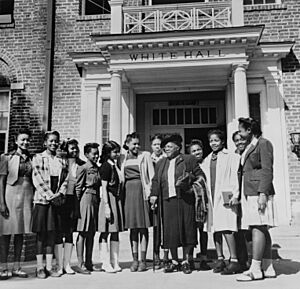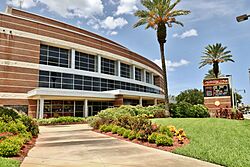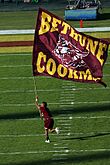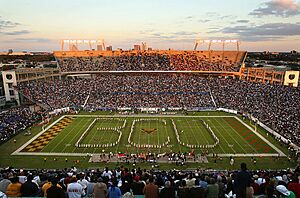Bethune–Cookman University facts for kids
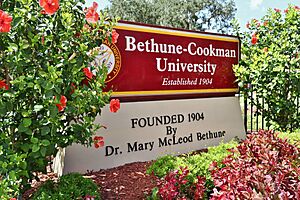 |
|
|
Former name
|
Daytona Normal and Industrial Institute for Girls (1904–1927) Cookman Institute for Boys (1872–1927) Daytona Cookman Collegiate Institute (1927–1941) Bethune–Cookman College (1941–2007) |
|---|---|
| Motto | On seal: "Heart, Head, Hand" "Enter to Learn, Depart to Serve" |
| Type | Private historically-black university |
| Established | October 3, 1904 |
| Accreditation | SACS |
|
Religious affiliation
|
United Methodist Church |
|
Academic affiliations
|
Space-grant |
| Endowment | $47.8 million (2016) |
| President | William Berry (acting) |
| Students | 2,513 (fall 2021) |
| Location |
,
,
United States
29°12′37″N 81°01′50″W / 29.2103°N 81.0306°W |
| Campus | Small City, 85.5 acres (34.6 ha) |
| Newspaper | Voice of the Wildcats |
| Colors | Maroon and gold |
| Nickname | Wildcats |
|
Sporting affiliations
|
NCAA Division I FCS - SWAC |
| Mascot | Wil D Cat |
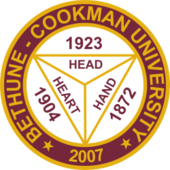 |
|
Bethune–Cookman University (often called B–CU or Bethune–Cookman) is a private university in Daytona Beach, Florida. It is known as a historically black university, which means it was founded to provide education for African American students. The university is connected with the United Methodist Church. Some of its important buildings, like White Hall and the Mary McLeod Bethune Home, are historic places.
Contents
Discovering Bethune–Cookman's History
How the University Started
Bethune–Cookman University began in 1904. It was founded by a remarkable woman named Mary McLeod Bethune. She started the Daytona Educational and Industrial Training School for Negro Girls. The very first students met in a home belonging to John Henry and Alice Smith Williams.
Growing into a College
Over the years, the school grew a lot. In 1923, it joined with the Cookman Institute, a school for boys from Jacksonville, Florida. After this merger, it became a high school for both boys and girls, called the Daytona Cookman Collegiate Institute. This new school became part of the Methodist Church's education system. By 1931, it had grown into a junior college.
Becoming a University
In 1941, the school started offering four-year degrees in subjects like liberal arts and teacher training. Its name changed to Bethune–Cookman College. Just two years later, in 1943, the first students earned their Bachelor of Science degrees in Elementary Education. The college continued to improve and received high ratings from important education groups.
In 2007, the school's Board of Trustees decided to change its name again to Bethune–Cookman University, showing its continued growth and expanded programs.
Important Moments and Challenges
Since 2000, the university has added new buildings and programs, like the Center for Civic Engagement and the L. Gale Lemerand School of Nursing.
In 2017, there was a notable event when Betsy DeVos was invited to speak at a graduation ceremony. Many students expressed their opinions and protested this decision. Students stood up and turned their backs during her speech to show their disagreement.
The university faced some challenges with its accreditation in 2018. Accreditation means a school meets certain quality standards. Bethune–Cookman worked hard to fix these issues and successfully maintained its accreditation by September 2020. This showed their commitment to providing a good education.
Leaders of the University
Many leaders have guided Bethune–Cookman University throughout its history. Here are some of the presidents:
- Mary McLeod Bethune (1904–1942, and again briefly in 1946)
- James A. Colston (1942–1946)
- Richard V. Moore, Sr. (1947–1975)
- Oswald Perry Bronson, Sr. (1975–2004)
- Trudie Kibbe Reed (2004–2012)
- Edison O. Jackson (2012–2017)
- Hubert L. Grimes (2017–2019; interim)
- E. LaBrent Chrite (2019–2021)
- Hiram Powell (2021–2022; interim)
- Lawrence Drake (2022–2023; interim)
- William Berry (2023–present; acting)
What You Can Study at B–CU
Bethune–Cookman University offers many different study programs. Students can choose from 39 bachelor's degrees and six master's degrees. The university has various schools and colleges, each focusing on different subjects. Between 1975 and 2004, the number of main study areas grew from 12 to 37.
Here are some of the areas you can study:
- Nursing
- Business & Entrepreneurship
- Education
- Graduate Studies
- Health Sciences
- Hospitality Management
- Liberal Arts
- Online & Professional Studies
- Performing Arts & Communication
- Science, Engineering, Mathematics
- Undergraduate Studies
- Religion
How to Get In
As of 2023, Bethune–Cookman accepted all students who applied. The university does not require ACT or SAT test scores for admission. However, students who did submit scores had an average SAT score of 905 or an ACT score of 16.5.
University Rankings
Universities are often ranked to show how well they are doing. In 2023, U.S. News & World Report ranked B–CU among the top Historically Black Colleges and Universities. It was also recognized for helping students from different backgrounds succeed. For 2024, U.S. News & World Report listed B-CU as one of the least expensive private colleges in the United States. In 2024, Washington Monthly ranked B–CU highly among liberal arts colleges for its positive impact on society. This includes helping students move up in life, doing important research, and encouraging public service.
The University Library
The first library at Bethune–Cookman College was the Harrison Rhodes Memorial Library. It was named after author Harrison Rhodes, whose family supported the school. Later, in 1941, a new library called the Carl S. Swisher Library was built. This new library was mostly paid for by Carl S. Swisher, a wealthy businessman.
Sports at B–CU
Bethune–Cookman is part of the Southwestern Athletic Conference (SWAC). Its sports teams, known as the Wildcats, compete in NCAA Division I FCS. The university offers 15 different sports programs for students.
Student Life and Groups
Bethune–Cookman has more than 80 student groups on campus. These groups include:
- Clubs for different academic subjects
- Honor societies for high-achieving students
- Greek fraternities and sororities (social clubs)
- Professional and service organizations
- Community service groups
- Leadership organizations
- Performance groups (like music and dance)
- International and religious-based organizations
The Marching Wildcats Band
Bethune–Cookman's marching band is famous and called "The Marching Wildcats." It is the largest student group on campus, with over 300 members. The band even appeared in the Netflix series Marching Orders. The marching band started in 1930 with only 30 musicians.
More to Explore
- Famous people who went to Bethune–Cookman University
- Independent Colleges and Universities of Florida
 | Jessica Watkins |
 | Robert Henry Lawrence Jr. |
 | Mae Jemison |
 | Sian Proctor |
 | Guion Bluford |


